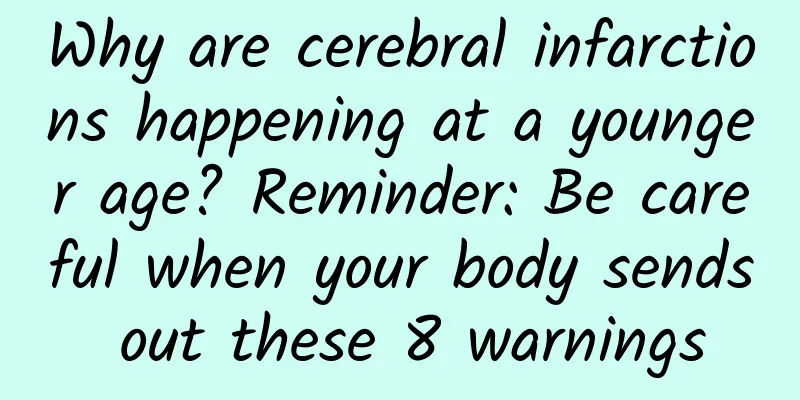Why are cerebral infarctions happening at a younger age? Reminder: Be careful when your body sends out these 8 warnings

|
25-year-old Arong (pseudonym) is a veteran game player. He often plays games day and night. When he is tired, he just smokes a cigarette to refresh himself. No matter what his family says to him, he turns a deaf ear to it. Recently, because of playing games all night for several days in a row, one side of his body suddenly became unable to move, and he felt dizzy and numb in his hands and feet. He thought he was just tired from staying up all night and would be fine after a rest, so he fell asleep directly. But after waking up, the numbness in his hands and feet not only did not get better, he also lost strength and began to have trouble speaking. After his family found out, they rushed him to the hospital. After examination, it was found that he had acute cerebral infarction. Fortunately, he was rescued in time and saved his life. After later rehabilitation treatment, Arong's speech and limb functions gradually recovered, avoiding disability caused by acute cerebral infarction. He has now been discharged from the hospital and returned home. Acute cerebral infarction (acute ischemic stroke) is a manifestation of cerebral stroke. It is caused by poor blood circulation in the intracranial blood vessels, which leads to occlusion of the corresponding blood vessels and then infarction lesions in the blood vessel supply area. The onset is relatively rapid. If the patient has a history of atherosclerosis, plaque formation or vascular stenosis, it may cause acute thrombosis, leading to an acute attack of cerebral infarction; if the blood clot in the patient's heart falls off to the brain blood vessels, it may cause blockage of the brain blood vessels and cause infarction in the corresponding part of the blood vessels. The main symptoms of patients are slurred speech, difficulty swallowing, and limb movement disorders such as immobility, fatigue, and numbness. Experts remind: When patients experience relevant symptoms, they should go to a regular hospital in time, and receive timely symptomatic treatment after a clear diagnosis to prevent delays in the disease. If an acute cerebral infarction occurs, you must pay attention to the issue of time. If a patient experiences numbness and weakness on one side of the limbs at home, or suddenly becomes inflexible in speaking or falls suddenly, it is recommended to seek medical attention promptly and call 120 to buy time for intravenous thrombolysis and reduce the incidence of sequelae. If the time for intravenous thrombolysis is missed, for example, if the onset of the disease exceeds 3-4.5 hours, it is recommended to start secondary prevention treatment of cerebral infarction as soon as possible. It should be noted that if acute cerebral infarction occurs within 24 hours, rapid blood pressure reduction is not recommended for patients with high blood pressure to avoid inappropriate rapid blood pressure reduction that aggravates the symptoms of acute cerebral infarction. Statistics show that there are 2 million to 2.5 million new stroke patients in my country every year, about one person is diagnosed every 12 seconds, and one person dies every 21 seconds. In recent years, the incidence of cerebral infarction has been trending towards younger people, and ischemic stroke has become more common and is on the rise. It can be seen that cerebral infarction is quietly "targeting" young people. Staying up late to work overtime, all-night entertainment, excessive fatigue, bad eating habits, smoking and drinking, long-term emotional excitement, sitting for long periods of time, obesity... may all be causes of cerebral infarction. Generally speaking, before a cerebral infarction occurs, the body will usually show some signals and abnormal symptoms. As long as they are discovered and treated in time, the occurrence of cerebral infarction can be prevented. Young friends, when your body shows these 8 symptoms, it may be sending you an "alarm". Don't delay any longer, seek help immediately! 01 Dizziness, headache Headache is one of the most common symptoms of cerebral infarction. When the headache is very severe, it is also accompanied by nausea, vomiting, dizziness, and nosebleeds. These symptoms often occur in patients with long-term hypertension. If you often feel dizzy and have symptoms of suspected cerebral infarction, but the symptoms are not serious, you can do three actions to check whether your cerebellum is insufficiently supplied with blood before going to the hospital: 1 Rapid rotation test Relax your hands, alternate between forward and backward movements, and pat your thighs quickly and gently. If you cannot keep up with the rhythm, you may have a cerebellar disease. 2 Rebound test Two people cooperate, one person holds the other person's arm with his hand, and then lets go unexpectedly to see if the other person can control his arm so as not to hit himself. If you can't control your arms, there may be something wrong with your cerebellum. 3 Heel-knee-shin test Lie flat on your back, straighten one leg, and lift the heel of the other leg, sliding from the straight knee of the leg along the shin to the calf. If you cannot control the movements of your legs, you may have a cerebellar disorder. 02 Speech disorders If you suddenly find that you can't speak clearly, have difficulty expressing yourself, have slurred speech, or even can't speak at all, then you need to consider the possibility of cerebral infarction. 03 Visual impairment Visual impairment, manifested as incomplete or blurred vision, usually disappears within an hour, but it may be a precursor to cerebral infarction. 04 Personality changes If there is a sudden change in personality, if you become very indifferent to people and things, or if you start talking non-stop and become abnormally irritable, or if your intelligence decreases, you should be careful of the possibility of cerebral infarction. 05 Yawning If you yawn constantly, it means that you are suffering from central hypoxia. About 80% of patients will experience this precursor phenomenon, which is usually more obvious 5 to 10 days before the onset of the disease. Therefore, if you suddenly start yawning constantly, you must go to the hospital for examination in time. 06 Transient blackouts In daily life or work, there will be a phenomenon of blackness in front of the eyes, but it will return to normal after a few seconds, and there will be no other discomfort. This phenomenon may also be a precursor to cerebral infarction. 07 Limb numbness If you find numbness on one side of your limbs or tingling while sleeping, and the numbness does not change even if you change your sleeping position, this may be a precursor to cerebral infarction. The numbness may be caused by insufficient blood and oxygen supply to the brain. In addition, some people may feel numbness in their hands and feet from time to time, and their hands and feet are out of control, but they recover after a few hours. At this time, don’t ignore it and should check it out in time. 08 Drooling while sleeping When a cerebral infarction is about to occur, health will be affected, and many people may drool unconsciously. Although drooling while sleeping is related to many reasons, the possibility of cerebral infarction cannot be ruled out. Because many people will suffer from brain dysfunction, central facial paralysis, facial paralysis, facial paralysis, inability to close lips, and drooling while sleeping due to cerebral infarction. What is the best way to treat cerebral infarction? How to prevent it? The most important thing for cerebral infarction is to get timely treatment. Since cerebral infarction is an irreversible chronic cerebrovascular accident, prevention is the most important. Preventing cerebral infarction Develop good eating habits, eat less greasy food, eat more protein-rich foods, such as fish, soy products, etc.; and eat more vegetables, fruits, grains, etc. Avoid sitting for long periods of time and do more aerobic exercise to promote blood circulation and speed up the body's metabolism. Avoid excessive mental tension and stress, ensure adequate sleep, combine work and rest, and maintain a good attitude. Control sugar intake and eat less sweets and candies. Diabetic patients should control blood sugar to avoid increased blood viscosity. Quit smoking and drinking, because smoking and drinking are also the culprits of increased blood viscosity. Treatment of cerebral infarction The best way to treat cerebral infarction is to adjust blood pressure, but it should not be lowered too low to avoid aggravating cerebral ischemia. Maintain unobstructed airways and provide oxygen promptly to patients with breathing difficulties. Perform tracheotomy if necessary for patients in severe conditions. If there is a large area of cerebral infarction, the intracranial pressure should be reduced in time. Warfarin tablets can be used as treatment drugs, and thrombolytic therapy can also be used. After treatment, you must pay attention to rest more and do some moderate exercise to improve your body's immunity. After being discharged from the hospital, patients should pay attention to a light diet, less oil and salt, and strictly control underlying diseases of arteriosclerosis such as hypertension, hyperlipidemia, diabetes, and undergo regular check-ups. -END- Source of this article: pexels (delete for infringement) |
<<: What's in some poop from 6 million years ago?
>>: If the whole of China were a real estate project, what types of apartments would there be?
Recommend
Dating Multiplication Technique online reading book, Dating Multiplication Technique pdf Baidu network disk download
Dating Multiplication Technique online reading bo...
My Apple ID is locked. How can I fix it? I have learned a lot after reading this article.
Apple ID is locked, how to solve it? You will lea...
How much does it cost to customize the Yongxin Musical Instruments Mini Program?
How much does it cost to customize the Yongxin Mu...
After reading Martin Whitman, I realized I was stupid.
Like "Securities Analysis", this is a b...
A kind of soft-seeded pomegranate that tastes super delicious. I won’t let you not know it!
Autumn is here, and temperate fruits are availabl...
Telecom network fraud is actually a script-killing
This article was first published by Hunzhi (WeCha...
Exploring the Android system: dumpsys command to obtain detailed information about system services
dumpsys is an executable file in the Android syst...
How many of the App Store's super exposure positions have you managed to hold?!
Currently, China has become the second largest iP...
NetEase Designer: How to design a banner that can make users pay?
We explore this in three dimensions: Data-driven ...
APP promotion: Ten methods used by experts to attract traffic, how many of them do you know?
There are a lot of them, so be patient and choose...
Has the new coronavirus strain CH.1.1 entered my country? Will it cause new infections? Authoritative interpretation——
On January 30, according to the latest data from ...
4 “Golden Rules” to Increase Revenue from Incentive Video Ads
The "dark horse" of motivational videos...
Lanzhou drone mini program function, how much does it cost to develop a drone mini program?
With the continuous popularity of short videos, ma...
If one day Apple's products are no longer popular...
Recently, Cook posted several pictures of Apple St...
After reading this article, I am dirty...
current Pursue a healthy living environment It ha...









